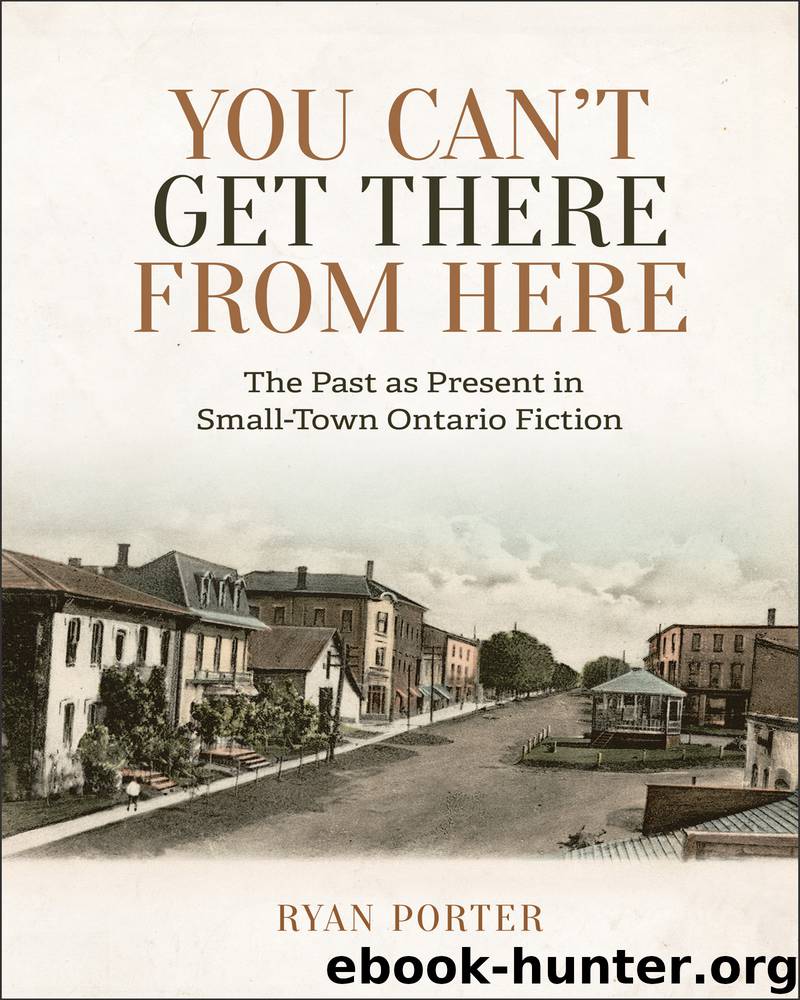You Can't Get There From Here: The Past as Present in Small-Town Ontario Fiction by Ryan Porter

Author:Ryan Porter
Language: eng
Format: epub
Tags: History, General, Canadian, Literary Criticism, Canada, ADD SUBJECT
Publisher: University of Toronto Press
Published: 2019-04-08T00:00:00+00:00
Beyond ordering the minutiae of her past life, Del wants to preserve those momentary flashes in which she perceives the order of fleeting experiences, and also to synthesize these moments to provide her past life with a sense of coherence. But this passage also marks both Del’s acceptance in principle of Craig’s project of documenting the region, and her decision to supplement his methods.
Del’s eventual artistic method contrasts sharply with the one she employs in the outline for her adolescent novel, sketched in the final chapter. This novel, while based on life in Jubilee, finds its form through Del’s thorough familiarity with genres of fiction rather than through her truthful observations of the town. The adolescent novel, constructed according to the precepts of genre, is ostensibly about the town’s noteworthy, yet collapsed, family the Sherriffs. Del, however, realizes the mimetic shortcomings of her tale: “I did not pay much attention to the real Sherriffs, once I had transformed them for fictional purposes” (248). In an instance in which her adult contemplation merges with her youthful experience, Del’s suggestion that her ultimate artistic vision will aim for an impossible accuracy comes only after a meeting with one of the real Sherriffs, Bobby, who has spent much time in a mental hospital. This meeting is an artistic revelation for Del, as she comes to reject the dishonest prerequisites of imported generic forms that direct the artistic eye and circumscribe observation (Smythe 127–8). Del’s subsequent attraction to Craig’s compulsive accuracy, his voracious veracity, is balanced by her recognition of the Sisyphean futility of simple documentation.
Craig’s approach to the past is laboured, and its drudgery registers on his body. In describing Craig’s office, Del takes special notice of a photograph on his wall, and imparts the parallels that exist between these photographic figures and Craig himself: “Several men in shirtsleeves, with droopy moustaches, and fierce but somehow helpless expressions, stood around a horse and wagon” (28). The physical exhaustion of these men’s lives is symbolized by the “droop” of their mustaches; the “helpless expressions” on their faces betray otherwise stoic countenances as only so much posturing. That physical depletion is echoed in Del’s description of Craig: “One of his eyes was blind, and had been operated on but remained dark and clouded; that eyelid had a menacing droop. His face was square and sagging, his body stout” (29). Much like his ancestors now tacked to his wall, Craig is weighed down by his task. The unselective recording of historical fact produces a weighty, voluminous manuscript constructed through the same blind work ethic required to clear land; each recorded fact is analogous to another felled tree, yet Craig fails to realize that his purpose is not to establish a field of facts. His effort exhausts and counteracts whatever artistic invigoration is required to shape his tome. Similarly, the family tree he compiles may be an “intricate structure of lives supporting us from the past” (31), but through Craig’s comprehensive methods of “historical inquiry,” it becomes
Download
This site does not store any files on its server. We only index and link to content provided by other sites. Please contact the content providers to delete copyright contents if any and email us, we'll remove relevant links or contents immediately.
| African | Asian |
| Australian & Oceanian | Canadian |
| Caribbean & Latin American | European |
| Jewish | Middle Eastern |
| Russian | United States |
4 3 2 1: A Novel by Paul Auster(11032)
The handmaid's tale by Margaret Atwood(6836)
Giovanni's Room by James Baldwin(5870)
Big Magic: Creative Living Beyond Fear by Elizabeth Gilbert(4717)
Asking the Right Questions: A Guide to Critical Thinking by M. Neil Browne & Stuart M. Keeley(4564)
On Writing A Memoir of the Craft by Stephen King(4205)
Ego Is the Enemy by Ryan Holiday(3982)
Ken Follett - World without end by Ken Follett(3968)
The Body: A Guide for Occupants by Bill Bryson(3789)
Bluets by Maggie Nelson(3705)
Adulting by Kelly Williams Brown(3663)
Guilty Pleasures by Laurell K Hamilton(3578)
Eat That Frog! by Brian Tracy(3505)
White Noise - A Novel by Don DeLillo(3429)
The Poetry of Pablo Neruda by Pablo Neruda(3358)
Alive: The Story of the Andes Survivors by Piers Paul Read(3302)
The Bookshop by Penelope Fitzgerald(3220)
The Book of Joy by Dalai Lama(3212)
Fingerprints of the Gods by Graham Hancock(3206)
